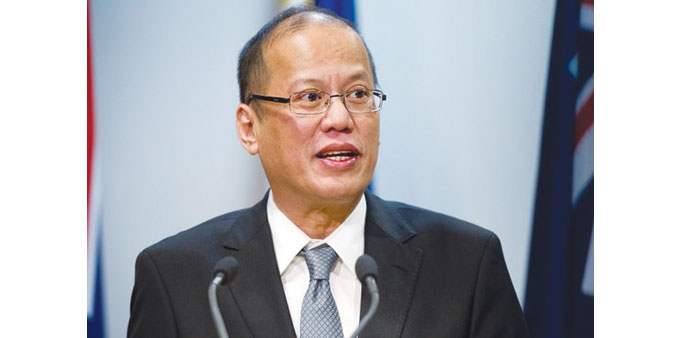DPA
Manila
President Benigno Aquino has had a lot to crow about when it comes to his much-hyped fight against corruption.
He has three Philippine senators, their top aides and several government officials facing trial for allegedly pocketing diverted congressional funds in the most high-profile corruption case so far. State-run Corps that have become cash cows for corrupt officials have been re-organised, and officials accused of graft and other irregularities removed.
But, just days ahead of his state of the nation address on Monday, it’s not all going his way. These developments are being overshadowed by a controversy involving a government spending programme approved by Aquino three years ago but declared unconstitutional by the Supreme Court on July 1.
While no one is accusing Aquino of enriching himself under the programme, the issue has raised concerns over the president’s determination to set new standards for accountability and transparency that will outlast his own tenure.
“Sending people to jail is part of fighting corruption, but more importantly he has to reform the system,” said political analyst Ramon Casiple, executive director of the Institute for Political and Electoral Reform.
“So far his straight-path slogan has not resulted in institutional reforms that people can use and look to in the future,” he added. Aquino’s drive against corruption hit a high point with the filing of plunder charges against senators Juan Ponce Enrile, Ramon “Bong” Revilla and Jose “Jinggoy” Estrada, their aides and more than 30 other people.
The three were the first senators to be indicted for plunder or large-scale corruption in the Philippine Senate’s history, said Justice Secretary Leila de Lima, who vowed that more people would be hauled to court as other investigations are completed.
Most people charged so far have been from the opposition. Enrile, Revilla and Estrada are being tried separately but for the same allegations: that they and their aides conspired with businesswoman Janet Lim Napoles to divert millions of dollars from a congressional development fund to non-existent projects or organisations.
They and their aides allegedly pocketed a total of more than 581mn pesos ($13.5mn) as commissions from the fund, long viewed as a pork barrel scheme for legislators. The tide has turned against the president however, as Aquino now faces at least two impeachment complaints for allegedly violating the constitution over the disbursement acceleration programme (DAP).
Dubbed “the president’s pork barrel” by opponents, more than 144bn pesos ($3.3bn) of state funds have been disbursed under the DAP to finance projects on infrastructure, education, disaster risk management and health, including stem cell research. The government says the spending programme helped propel the economy to one of the fastest growing in Asia and improved public services.
Analysts such as economist Solita Monsod also reject allegations that the DAP was the president’s slush fund.
“I think this was an excellent way of making sure that the people’s money was not allowed to lie idle, and slow down the development objectives of the country,” she said in a newspaper weekly column.
But other observers say the DAP created a bad precedent that could be exploited by future leaders.
“Taking an unconstitutional shortcut only dilutes accountability, relieves voters and congressmen from the consequences of their choices, and sets the stage for a more corrupt president in 2016 or beyond to channel spending for his own benefit,” an editorial in the Wall Street Journal said. Casiple said he believes that Aquino can easily beat the impeachment charges because he has strong support in Congress, but cautioned the president against ignoring the public outcry.
Public opinion surveys show Aquino’s popularity at its lowest level since 2010, and corruption is expected to figure highly in his state of the nation address on Monday.
“It’s not just his popularity that is at stake here, but his legacy,” Casiple said.
“The people are now measuring him in terms of performance and fulfilment of expectations. So far, we haven’t seen something to remember him by.”

